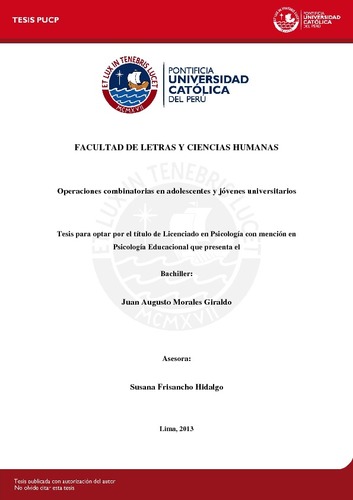| dc.contributor.advisor | Frisancho, Susana | es_ES |
| dc.contributor.author | Morales Giraldo, Juan Augusto | es_ES |
| dc.date.accessioned | 2013-08-21T22:59:33Z | es_ES |
| dc.date.available | 2013-08-21T22:59:33Z | es_ES |
| dc.date.created | 2013 | es_ES |
| dc.date.issued | 2013-08-21 | es_ES |
| dc.identifier.uri | http://hdl.handle.net/20.500.12404/4703 | |
| dc.description.abstract | En la teoría del desarrollo cognitivo de Jean Piaget, las operaciones combinatorias
emergen al inicio de la formación del pensamiento formal y hacen referencia a la
capacidad de las personas para concebir y organizar sistemáticamente todas las
posibilidades y dimensiones que pueden interactuar como elementos y causas de un
problema o suceso complejo. Debido a que este desarrollo ya debe haberse dado en el
contexto escolar y es esencial en el contexto universitario, el objetivo de esta
investigación fue evaluar la capacidad combinatoria de un grupo de estudiantes de una
universidad privada de Lima. Se contó con la participación de 12 alumnos (seis mujeres
y seis varones) que cursaban sus primeros ciclos de formación universitaria y cuyas
edades estuvieron entre los 16 y 20 años. Teniendo como referencia el método crítico de
Jean Piaget, se utilizaron seis tareas con estructura combinatoria que se tomaron de las
investigaciones de este autor y de otros trabajos sobre el tema. Los resultados muestran
que la mayoría de estudiantes resolvió apropiadamente los problemas planteados,
aunque algunos exhibieron una serie de dificultades y otros no pudieron resolver varias
de las tareas. El análisis y explicación de estas variaciones en el desempeño de los
participantes, se realizó desde una aproximación sistémica y articulada de los conceptos
más importantes de la teoría de Piaget y considerando la importancia de la capacidad
combinatoria para el desarrollo cognitivo y el pensamiento científico en el contexto
universitario.
Palabras clave: Pensamiento formal, operaciones formales, combinatoria, desarrollo
cognitivo adolescente, pensamiento científico, educación superior | es_ES |
| dc.description.abstract | In Jean Piaget's theory of cognitive development, combinatorial operations emerge at
the onset of formal operational thought and refer to the logical capacity of people for
conceiving and organizing systematically all possibilities and dimensions that can
interact as elements or causes of a complex problem. Because this development should
already occur during basic education and since it is essential for higher education, the
objective of this study was to evaluate this combinatorial capacity in a group of students
from a private university in Lima. Assuming the critical method of Jean Piaget, twelve
university freshmen (six women and six men) aged between 16 and 20 years,
participated in solving six tasks with combinatorial structure that were taken from
Piaget's research and other papers on the subject. The results show that most students
properly resolved the proposed problems, although some exhibited a number of
difficulties and others could not solve several tasks. The analysis and explanation of
these variations in performance was carried out from a systemic and coordinated
approach of the most important concepts of Piaget's theory and considering the
importance of combinatorial capacity for cognitive development and scientific thought
in higher education.
Key words: Formal thought, formal operations, combinatory, adolescent cognitive
development, scientific thought higher education. | es_ES |
| dc.language.iso | spa | es_ES |
| dc.publisher | Pontificia Universidad Católica del Perú | es_ES |
| dc.rights | Atribución-NoComercial-SinDerivadas 2.5 Perú | * |
| dc.rights | info:eu-repo/semantics/openAccess | es_ES |
| dc.rights.uri | http://creativecommons.org/licenses/by-nc-nd/2.5/pe/ | * |
| dc.subject | Combinaciones (Matemáticas) | es_ES |
| dc.subject | Cognición. | es_ES |
| dc.subject | Estudiantes universitarios--Perú--Investigaciones | es_ES |
| dc.subject | Pensamiento científico | es_ES |
| dc.title | Operaciones combinatorias en adolescentes y jóvenes universitarios | es_ES |
| dc.type | info:eu-repo/semantics/bachelorThesis | es_ES |
| thesis.degree.name | Licenciado en Psicología Educacional | es_ES |
| thesis.degree.level | Título Profesional | es_ES |
| thesis.degree.grantor | Pontificia Universidad Católica del Perú. Facultad de Letras y Ciencias Humanas. | es_ES |
| thesis.degree.discipline | Psicología Educacional | es_ES |
| renati.discipline | 313046 | es_ES |
| renati.level | https://purl.org/pe-repo/renati/level#tituloProfesional | es_ES |
| renati.type | http://purl.org/pe-repo/renati/type#tesis | es_ES |
| dc.publisher.country | PE | es_ES |
| dc.subject.ocde | http://purl.org/pe-repo/ocde/ford#5.01.00 | es_ES |






